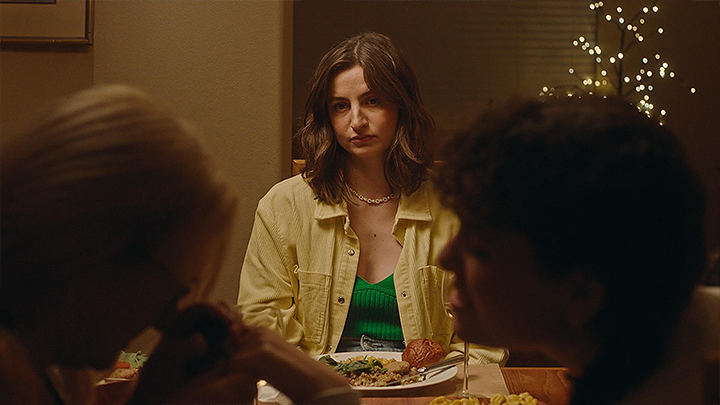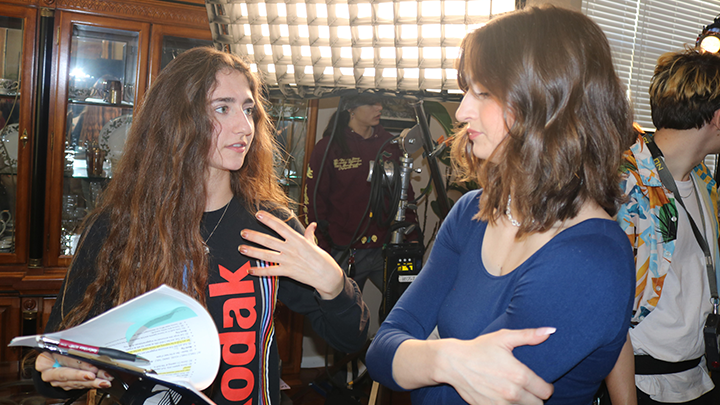Valentine’s Day Student Film Festival: A tradition to celebrate love at SDSU
Shayna Punim extends an invitation to embrace acceptance and open communication in all forms of relationships.

For the eighth consecutive year, San Diego State University is celebrating love with its traditional Valentine’s Day Film Festival. The event showcases selected projects from SDSU student filmmakers, featuring their in-class short-film assignments related to love and relationships.
There are a variety of films showcased throughout the semesters and generations of SDSU students. Some of these short films are making their debut on the big screen, while others are award winners from past years and competitions.
The project’s pitches originated from a thesis class, TFM 560 Advanced Film, where students create films of every imaginable genre. The class collectively votes for their favorites, and the selected films become the focus of the semester-long project. These chosen films, all featuring romantic or relationship-related themes for the occasion, aim to deliver an unforgettable experience, setting the mood for Valentine’s Day as they send people off into a romantic atmosphere through the world of cinema.
This year’s closing short film is titled “Shayna Punim,” written and directed by student alumni filmmaker Emilie Anderson.
It marks the first time the finalized version will be screened to the public. The film is one of the most recent creations from the Television, Film and New Media (TFM) department. Anderson graduated this past spring 2023 with a B.S. in Television, Film, and Media Studies. She describes the process of creating the film as an amazing experience and her first opportunity to lead a film project also written by her.
Anderson highlighted the importance of her production team — composed entirely of SDSU students or alumni (besides the actors) — in the outcome of the project. Describing it as an interesting experience and a privilege to have trust with people she had recently met in the class, trusting her with her vision.
“They’re such a close community,” Anderson said. “I think that making a film that was so much about family and friends and the different kinds of love and relationships was really special, having done so with the SDSU community.”
When creating the film, Anderson’s primary goal was to portray an experience she could relate to, speak about, and most importantly, something she knew well. The topics discussed in the film, such as communication, relationships, family and ambition, are all topics familiar to Anderson. She hopes to convey these familiar themes through her film, aiming for it to be something that feels realistic and can resonate with others, mirroring aspects of their lives.

In the short film, the main character, Donna, played by Jessica Fernstrom, portrays the emotions felt by those who are not in romantic relationships during these festivities. Donna feels pressured to be in a relationship, driven by what she believes her parents expect from her and her life goals. The film takes an unexpected turn when Donna expresses her frustration and pressure to engage in a romantic relationship, instead of focusing on her desired career path as a writer.
Although Donna’s breakout of confession is impulsive and disjointed, her family understands her anguish and embraces her decisions with empathy. The unexpected twist in both the audience’s perception and the character’s development is evident and well-portrayed in Fernstrom's acting. In the end, it was all one giant miscommunication.
“It's really interesting because I think that people have a tendency to do that in general, specifically, if they're already feeling insecure about where they're at in life or they're starting to feel anxious about things… like they're falling behind in some way. I really wanted to show that specifically,” said Anderson.
“I think Donna feels this pressure from her family to be in a relationship. She interprets it as that they're disappointed in her for not being in the same place as her sister … In the end, what she really realizes is that her family wants her to be happy even if it's not the same way her sister is.”
When asked about the main meaning of the short film, Anderson emphasized the importance of communication in every type of relationship.
A fun fact about the creative process of Shayna Punim is Anderson wrote most of the script while serving her jury duty.
“Weirdly, I think it was like finding a long period of time where I was just sitting there with my thoughts,” she said. “I remember I just pulled up my computer and wrote everything that was in my head … it was really cool, it was a film that was just very personal to me and was very fun to write.”
Richard Underwood, lecturer in the College of Professional Studies and Fine Arts and organizer of the Valentine's Day Film Festival, said students tend to gravitate towards stories centered around relationships, exploring interactions and their involvement. It is a trend he finds worthy of celebration.
Underwood noted the different challenges this festival represents, compared to the also annual Howling Film Festival celebrated every October. While it can be relatively easier to elicit scary feelings, he said, portraying comedy, positivity, or uplifting emotions can be a more challenging task.
“Sometimes with films, it's easier to portray negative emotions. And I do think sometimes—not always, but sometimes — It is harder to realistically show happiness or positive relationships in a way that doesn't end up feeling cheesy or cliche,” said Anderson.
“I think the Valentine’s Day Film Festival is exactly the opposite of the Halloween Film Festival,” said Underwood.
Underwood chose the film Shayna Punim as the closing short film of this year’s festival because he believes it can leave the audience with a “happy” ending and a renewed sensation of love. The intention is for the audience to take home and celebrate love with a careful selection of the best works from SDSU film students.
The Valentine’s Day Film Festival is scheduled for Feb. 14 starting at 7:30 p.m., at the Main Stage Theatre. Tickets, priced at $10, can be purchased on the TFM’s website.



